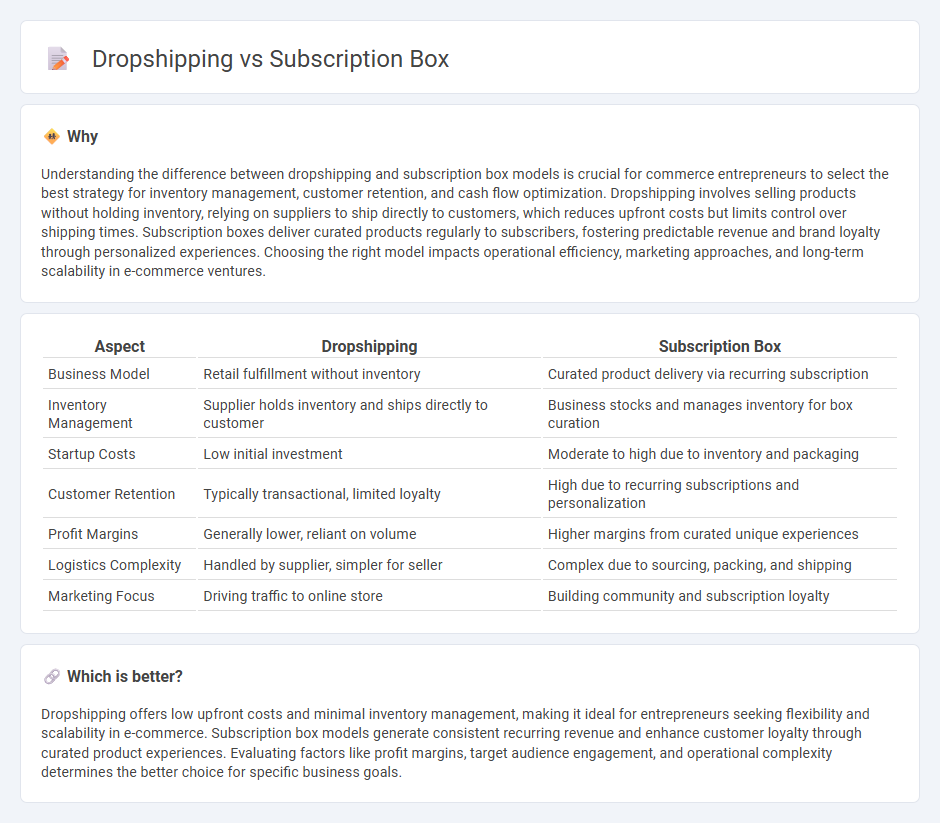
Dropshipping allows retailers to sell products without holding inventory by partnering with suppliers who ship items directly to customers. Subscription boxes provide curated product experiences delivered regularly, fostering customer loyalty and predictable revenue. Explore the nuances of dropshipping and subscription boxes to determine the optimal e-commerce strategy for your business goals.
Why it is important
Understanding the difference between dropshipping and subscription box models is crucial for commerce entrepreneurs to select the best strategy for inventory management, customer retention, and cash flow optimization. Dropshipping involves selling products without holding inventory, relying on suppliers to ship directly to customers, which reduces upfront costs but limits control over shipping times. Subscription boxes deliver curated products regularly to subscribers, fostering predictable revenue and brand loyalty through personalized experiences. Choosing the right model impacts operational efficiency, marketing approaches, and long-term scalability in e-commerce ventures.
Comparison Table
| Aspect | Dropshipping | Subscription Box |
|---|---|---|
| Business Model | Retail fulfillment without inventory | Curated product delivery via recurring subscription |
| Inventory Management | Supplier holds inventory and ships directly to customer | Business stocks and manages inventory for box curation |
| Startup Costs | Low initial investment | Moderate to high due to inventory and packaging |
| Customer Retention | Typically transactional, limited loyalty | High due to recurring subscriptions and personalization |
| Profit Margins | Generally lower, reliant on volume | Higher margins from curated unique experiences |
| Logistics Complexity | Handled by supplier, simpler for seller | Complex due to sourcing, packing, and shipping |
| Marketing Focus | Driving traffic to online store | Building community and subscription loyalty |
Which is better?
Dropshipping offers low upfront costs and minimal inventory management, making it ideal for entrepreneurs seeking flexibility and scalability in e-commerce. Subscription box models generate consistent recurring revenue and enhance customer loyalty through curated product experiences. Evaluating factors like profit margins, target audience engagement, and operational complexity determines the better choice for specific business goals.
Connection
Dropshipping and subscription box models both revolve around streamlined inventory management and direct-to-consumer fulfillment, reducing upfront costs and risks for e-commerce businesses. Dropshipping allows subscription box companies to source diverse products without holding inventory, enabling flexible and curated monthly offerings. This synergy enhances scalability and customization, driving customer retention and operational efficiency in commerce.
Key Terms
Inventory Management
Subscription box services require precise inventory management to ensure curated products are consistently available for scheduled deliveries, minimizing overstock and shortages. Dropshipping eliminates the need to hold inventory by relying on suppliers to ship products directly to customers, reducing storage costs but increasing dependence on third-party stock accuracy and shipping times. Explore more to optimize your business model based on inventory control strategies.
Fulfillment Method
Subscription box fulfillment involves curating, packaging, and shipping products on a recurring schedule, ensuring consistent delivery to subscribers and managing inventory in-house or through specialized warehouses. Dropshipping fulfillment relies on third-party suppliers to store inventory and ship products directly to customers, eliminating the need for upfront inventory investment and reducing handling responsibilities. Explore the detailed pros and cons of each fulfillment method to determine the best fit for your e-commerce business model.
Customer Retention
Subscription boxes excel in customer retention by offering curated, personalized products that foster brand loyalty and recurring revenue. Dropshipping models often face challenges with customer retention due to inconsistent product quality and longer shipping times, which can impact repeat purchases. Explore effective strategies to enhance customer retention in both subscription box and dropshipping businesses.
Source and External Links
The 40 Best Monthly Subscription Boxes in 2025 - A curated list of top subscription boxes across various categories like fashion, food, lifestyle, and more, highlighting popular options such as Boxycharm for women and Bespoke Post for men.
Subscription box - Wikipedia - Subscription boxes are recurring deliveries of niche products used as a marketing strategy and product distribution method, appealing for discovery and convenience, with many varieties available primarily in the US market.
5 Subscription Boxes That Bring Joy Right to Your Doorstep! - A video showcasing five different subscription boxes, including options for apparel, tea, and lifestyle products, with discount codes and links for subscribing.
 dowidth.com
dowidth.com